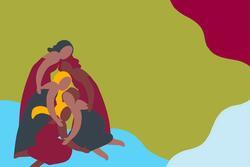Social Dates, Gossip, and Exclusion: Combating Toxic Hookup Culture and Heteronormativity at My Jewish Camp
As a short, innocent fifth-grader strolling into my first summer at overnight camp, I assumed my summer would revolve around typical camp experiences: waterskiing, the camp play, Shabbat services, evening activities, field trips, and volleyball tournaments. I wasn’t entirely wrong, but that summer at camp, along with my seven summers following it, also centered some topics I wasn’t anticipating: boys, relationships, and hookups.
My first year of camp, the campers in my bunk would constantly giggle about our primary subjects of discussion: crushes and dates to the social dance. Bunk drama surrounding boys was omnipresent; mass frenzy about social dates got to the point where my counselors banned us from going on walks with boys (thus eliminating any chances of friendships with them).
The summer after eighth grade, the boy-related conversations turned to first kisses behind the tennis shed, gossip about which boys wanted to “get with” which girls, and debates about which bikini was the cutest to wear at the luau with the boys. The entire camp experience began to revolve around who you wanted to hook up with, a camp rite of passage we internalized as being necessary and universal.
Four summers later, as a counselor at camp, I noticed even subtler ways this all-encompassing hookup culture is engrained in our camp day-to-day life. Campers are embarrassed as their first kisses are announced at meals in disguised announcements of “getting up on waterskis” or “losing a tooth,” to which the counselors and older campers erupt in cheers. Older campers are forced to play the classic game of “kissing rugby,” where counselors select campers to wrestle and then kiss other campers (on the cheek). Word about hookups spreads incredibly fast, and you can bet that the majority of a particular age group, counselors, and even administrators are aware of the current camp couples.
In short: there’s no way of escaping the camp’s hookup culture and heteronormativity. Whether you’re someone who wants to participate without it being discussed by everyone, someone who has no interest but finds the entire camp experience revolves around it, or someone who is not cishet and finds it incredibly hard to navigate, the toxic culture at camp harms everyone.
Personally, the prevalence of discussions, games, and subtle and outright mentions of hookups significantly harmed my camp experience. As someone who’s never been interested or involved in romantic relationships at camp, I always felt incredibly ostracized from my camp friends and camp as a whole. I often wondered—was something wrong with me? Was I holding myself back from the full camp experience I should be getting? Even though I wasn’t looking to participate, I felt overwhelmed by the negative self-perception, anxiety, and friendship troubles that ensued. I found myself isolating from my fellow campers, feeling younger or immature, and lacking the meaningful friendships I'd hoped to gain. At the same time, I found myself desperately craving the same male-fueled validation as my bunkmates, which placed incredible stress on my appearance and created an intense mindset of self-consciousness at a very young age.
In a culture that places so much emphasis on heterosexual hookups and relationships, any LGBTQ+ campers are immediately othered. Likewise, in this sexualized space, campers who aren’t noticed quickly take on many assumptions about their attractiveness and worth. When I spoke with a camp friend recently, she described how it felt to be an older camper and one of the only girls in her bunk who'd not had a "camp hookup” yet. She told me: “I started to question myself, my own self-worth, and my attractiveness. I wondered if something was wrong with me because I hadn’t gotten with anyone yet. If the pretty, fun, and friendly people that I was friends with all kissed someone but I hadn’t, did that mean something about me? I wasn’t sure.”
Even as a counselor today, this toxic culture makes my summers so much more difficult. Hookup dynamics on staff aren’t all that different, and even worse in some situations: rumors, pressure, public announcements of certain firsts, homophobia, harassment, and even coercion. By failing to address hookup culture for our young campers, the same issues become even more amplified for college-aged counselors.
This is learned behavior, resulting from years of living and breathing the hookup culture of announcements, questions, stories, walks, and more. I know how difficult it is to try to shift norms that are as deeply rooted as these. But I firmly believe that I owe it to my campers, my past self, and the future generations of camp to try to shift this toxic culture to one where campers are free to experience camp in a way that is beautiful and meaningful to them: whether that be exploring their identity, discovering a meaningful connection to music or dance, or experiencing precious friendships and first relationships.
So, how do we get there?
I believe this work starts with the counselors, in both recognizing the toxic culture we’ve grown up in and thinking through how we can change it for our campers. In our bunk meetings the first few days of camp, we can host open conversations surrounding camp relationships, boundaries, and consent––tailored to our campers’ ages, of course. Campers should know they can totally feel free to engage in relationships if they want, but there’s no pressure to do so, especially if they don’t feel ready. This guidance doesn’t simply live in the camp bubble, either; these are pieces of knowledge and skills that are important for campers to take home with them.
Shifting the energy away from solely discussing camp hookups is necessary as well. Counselors often forget how much influence we have over our campers, but they really do look to us for everything we discuss and model. By begging our campers for details about their crushes or hookups, we reinforce the notion that they are an integral part of camp. And we absolutely can, and should, put an end to larger structures that explicitly enforce hookup culture: announcements that publicly display relationships, information that makes its way to all of the counselors, games forcing campers into kissing, and more.
At the end of the day, camp should be a place for friendship, learning, and exploration. It should be a community for creating beautiful memories, experiencing the joy of belting Sweet Caroline during song sessions, and competing in intense games of Spot It with soon-to-be best friends. I will admit that my time as a camper was sadly tainted with anxiety and self-deprecation as I tried to navigate the toxic culture, and I currently see the same feelings developing in my young campers. I know this issue is broader than any one Jewish overnight camp, too. I’m inspired by other groups and camps working to improve their cultures (shoutout to Jewish Teens for Empowered Consent!), and I’m currently in conversations with my camp administration about ways to address our culture this summer. I’m optimistic about the changing views toward camp hookup culture, and how many people are deeply resonating with these conversations. Truly, we owe it to our young campers to shift our camp cultures toward more inclusive communities where we empower friendship, consent, and growth.
This piece was written as part of JWA’s Rising Voices Fellowship.








Wonderful article Talia, and thank you for the JTEC shoutout! Keep up the amazing work!